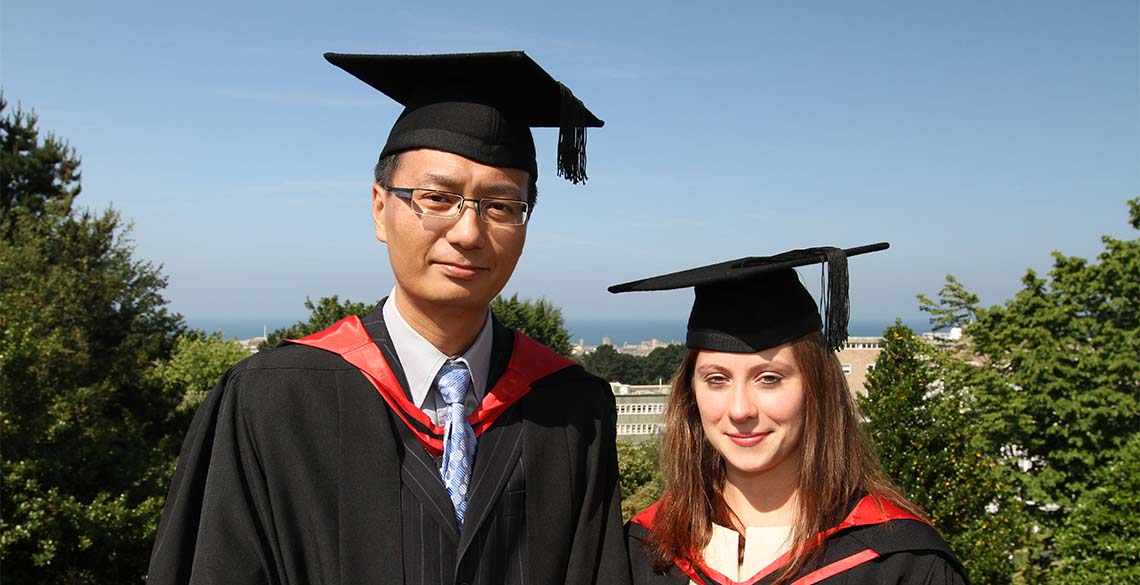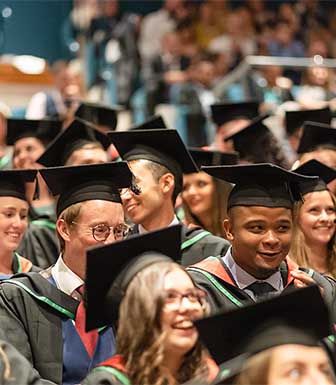

Masters student vs candidate [Which to use?]
Academia is an antiquated place with rules and etiquette around many aspects of terminology for students and candidates. There is a very strict definition which helps you decide whether or not to use master’s student vs candidate.
Strictly speaking, it is best to use master’s student for most of the degree. A master’s candidat e is someone who has passed all the comprehensive exam components of their degree and is in the process of meeting the final requirements for the degree.
In my experience after 15 years in academia, modern academics tend to use candidate and student interchangeably as the exam and thesis components happen simultaneously.
During my master’s in chemistry, I only ever refer to myself as a Masters student and that was generally accepted by everyone I spoke to.
However, there are some actual rules associated with when you can use either student or candidate.
This article will cover everything you need to know about masters student versus candidate questions and give you an idea of which is the best to use in your current situation.
To properly understand the textbook definition of student versus candidate we should look at the definitions of each.
Definition of student
According to the Merriam – Webster dictionary , a student is a known which describes a scholar or learner who is attending a school and one who studies a particular field.

Someone currently enrolled in a Masters is certainly fitting with that definition. They are currently attending a university and taking postgraduate level courses and exams to study a particular field.
The first known use of the term student was in the 15 th century and was used to describe a scholar learning new information.
Definition of a candidate
According to the Merriam – Webster dictionary, a candidate is a student in the process of meeting final requirements for a degree.

In the case of a Masters degree you can imagine a situation where all of the exams have been passed and the student is currently submitting and/or awaiting the final decision on acceptance of their thesis or research report.
Therefore, it is appropriate to refer to a Masters student when they are nearing the final requirements for their degree.
What is the difference between a masters candidate and student?
For the majority of a Masters degree it is more appropriate to refer to them as a Masters student.
Once the exam portion of the course has been completed and they are in the final stages of their degree it would be more appropriate to refer to them as a candidate.
A candidate is one who has completed the courses but has not finished writing and/or defending his/her thesis (Master’s report) or dissertation (PhD report).
Can you use candidate instead of student?
In my experience, in 15 years of academia, we very rarely concerned ourselves with the strict use of Masters student vs candidate.
If you were to ask the majority of academics I would imagine that they would not care about the use of either Masters student or candidate to refer to someone who is currently pursuing a Masters level degree.
It is only once the official documentation of the University gets involved that there may be a strict definition used.
Feel free to use candidate instead of student if you feel like you have satisfied all of the course components and are awaiting a final decision on your Masters thesis.
What it means to be a master’s student
There are number of important moments in a Masters degree that act as milestones for completion.
It is possible to use these different milestones to delineate between using student and candidate.
Here are all of the important Masters milestones and the most appropriate way to refer to the person currently admitted to the degree.
Even though there are some nuances between different universities, these are the general steps associated with completing a Masters degree and the appropriate terminology to refer to the person undergoing the qualification.
Wrapping up
This article has covered everything you need to know about Masters student versus candidate and at what stage of their qualification the convention dictates that they change from a PhD student to a PhD candidate.
Ultimately, if the person admitted to the degree is in the process of meeting the final requirements of the degree they are referred to as a Masters candidate. Before that, they are a Masters student.
In real life, it is not really something that academics really care about and will often use the term, Masters student and Masters candidate interchangeably.
However, academia has some antiquated and strict rules around the terminology. This will be reflected in the official University documentation when communicating with the University about the milestones achieved during the degree.

Dr Andrew Stapleton has a Masters and PhD in Chemistry from the UK and Australia. He has many years of research experience and has worked as a Postdoctoral Fellow and Associate at a number of Universities. Although having secured funding for his own research, he left academia to help others with his YouTube channel all about the inner workings of academia and how to make it work for you.
Thank you for visiting Academia Insider.
We are here to help you navigate Academia as painlessly as possible. We are supported by our readers and by visiting you are helping us earn a small amount through ads and affiliate revenue - Thank you!

2024 © Academia Insider


BA, BSc, MA, MSc, PhD - what do they all mean?

BA, BSc, MA, MSc, PhD (and more) are abbreviations of British degrees.
They reflect the specific level and discipline of a qualification achieved at university.
While most courses are conducted on a full-time basis, there are options for part-time, distance learning and other flexible learning arrangements.
Here is a breakdown of some of the most common qualifications and ones that Aberystwyth University offers.
- BA = Bachelor of Arts, Humanities and Social Sciences;
- BSc = Bachelor of Sciences;
- BENG = Bachelor of Engineering (Software, Robotics and Physics);
- LLB = Bachelor of Law.
Achieved after 3 to 4 years of study. The extra year (for a 4 year course) can be from a year studying abroad or a year working in industry.
Integrated-Masters:
- MARTS = Masters of Arts;
- MBIOL = Masters of Biology;
- MCOMP = Masters of Computer Science;
- MENG = Masters of Engineering;
- MMATH = Masters of Mathematics;
- MPHYS = Masters of Physics;
- MSCI = Masters of Sciences and Humanities.
4 years course (3-year Bachelors, 1 year Masters) that enables you to secure a loan for the full duration rather than having to fund a Masters degree separately.
- MA = Masters of Arts, Humanities and Social Sciences;
- MSc = Masters of Sciences;
- MBA = Masters of Business Administration;
- MPhil = Masters of Philosophy: Advanced research Masters degree;
- MRes = Masters of Research: Contains some taught and research elements;
- LLM = Masters of Law.
Achieved after graduation from Bachelors level, usually 1-2 years duration.
- PhD = Doctor of Philosophy: for a range of disciplines.
Achieved after graduating from Masters level, usually 3-8 years duration.
A wide range of Undergraduate, Postgraduate and Further-Research courses – across the Arts and Sciences – are available at Aberystwyth.


- MPhil vs MSc – Differences Explained
- Types of Doctorates
On first glances, the difference between an MPhil and an MSc may appear marginal, but this couldn’t be further from the truth.
While both degrees are a postgraduate Masters qualification, they’re designed for two opposite career paths – an MSc for a career in industry, and an MPhil for a career in research or on the way to a PhD. Learning the differences between the two forms of postgraduate study will allow you to make an informed decision about your next steps and offer a clearer path to your ideal career.
This page will give you an understanding of what an MPhil and MSc are, their differences, and ultimately, which of the two degrees is better suited for you.
What Is an MPhil?
An MPhil is an advanced postgraduate degree short for Master of Philosophy . The degree is typically undertaken after an undergraduate degree by those who wish to gain specialised knowledge in original research. Although discussed later, it’s important to distinguish between the two ways an MPhil may be undertaken as we will only focus on one of them for reasons you will see.
An MPhil can be undertaken as either:
- a standalone degree lasting two years. Successful completion of this research degree will lead to being awarded a Master of Philosophy.
- (1) their research skills are considered suitable and their MPhil programme is upgraded to a PhD programme, or
- (2) their research skills are considered unsuitable, but they have the opportunity to complete the second year of their MPhil programme to be awarded a Master of Philosophy.
While the MPhils from both routes will be identical, it’s likely that if you’re trying to weigh up the differences between an MPhil and an MSc, you would be more interested in the standalone MPhil route given its greater similarities to an MSc. Because of this, we’ll mainly focus on the standalone path in comparing an MPhil to an MSc. We recommend you read our full guide to an MPhil if you’re interested in undertaking one as a precursor to a PhD.
What Is an MSc?
An MSc is a Master’s degree short for Master of Science . Like an MPhil, they’re typically undertaken shortly after completing an undergraduate course such as a Bachelor’s degree. While MPhil courses are available in nearly all fields, MSc’s are exclusive to STEM-based subjects, such as engineering, physics and maths.
An MSc may sound like a specialist degree reserved for a few career paths, however, they’re a common Masters course taught in most universities. Regardless of your subject or university, an MSc is typically a one-year course and aims to increase your knowledge of specific topics within your field.

MPhil vs MSc – Differences Explained
An MPhil and an MSc may seem similar – both are postgraduate Master’s degrees, both are typically undertaken after an undergraduate degree, and both are available to STEM students. Yet, there is a crucial difference between the two; and this difference will likely be the deciding factor in which degree is best for you.
This difference is your intended career path .
The degrees target two different professions; an MSc a profession in industry and an MPhil a profession in research. To make this possible, the degrees set out to provide you with a unique set of skills and specialised knowledge.
As an MSc is aimed at those wishing to develop a career in industry, it focuses on providing practical knowledge which has uses within the workplace. Therefore, while theoretical-related concepts may be taught, they will form a small part of your learning material with the focus instead on practical topics. For example, a civil engineering student may undertake an MSc in Construction Project Management ; here, topics from resource planning to cost and risk management would be covered.
Finding a PhD has never been this easy – search for a PhD by keyword, location or academic area of interest.
Unlike an MSc, which although may contain research-based components depending on the university, an MPhil is almost always a research-only degree. As a result, the degree is mainly undertaken by those who wish to pursue a research-based profession.
As discovered earlier, an MPhil may also be undertaken as a precursor to a PhD by those who wish to have a career in advanced research or academia. Where an MSc focuses on broader knowledge around several specialised subject areas, an MPhil focuses on a specific research question, within a specialised topic. In other words, it goes a level of specialisation deeper than an MSc. For example, had the previous civil engineering student opted for an MPhil instead of an MSc, their study and therefore resulting knowledge may have centred around ‘how risk management may better be managed through the use of technology’. It’s for this reason most consider an MPhil a ‘mini-PhD’ and an MSc as a specialised ‘addon’ to an undergraduate degree.
MPhil vs MSc: Table Summarising Differences
Is an mphil better than an msc.
Academically, an MPhil is the most advanced Masters qualification you can obtain. For this reason, it sits above an MSc but below a PhD in terms of course difficulty, and ‘academic prestige’ if such a thing even exists.
However, you would be mistaken to think this makes an MPhil degree better or more valuable than an MSc degree. In truth, we’ve seen how both degrees meet the different long-term requirements of the postgraduate student undertaking them. Therefore, the better question would be ‘which degree is better suited for you?’.
If your goal is to gain practical knowledge which you can apply to your industry, then an MSc is likely for you. On the other hand, if your goal is to have a profession in education or research, an MPhil will likely be the better option, especially as a precursor to a PhD degree.
Browse PhDs Now
Join thousands of students.
Join thousands of other students and stay up to date with the latest PhD programmes, funding opportunities and advice.
- JEE Main 2024
- MHT CET 2024
- JEE Advanced 2024
- BITSAT 2024
- View All Engineering Exams
- Colleges Accepting B.Tech Applications
- Top Engineering Colleges in India
- Engineering Colleges in India
- Engineering Colleges in Tamil Nadu
- Engineering Colleges Accepting JEE Main
- Top IITs in India
- Top NITs in India
- Top IIITs in India
- JEE Main College Predictor
- JEE Main Rank Predictor
- MHT CET College Predictor
- AP EAMCET College Predictor
- GATE College Predictor
- KCET College Predictor
- JEE Advanced College Predictor
- View All College Predictors
- JEE Main Question Paper
- JEE Main Cutoff
- JEE Main Advanced Admit Card
- JEE Advanced Admit Card 2024
- Download E-Books and Sample Papers
- Compare Colleges
- B.Tech College Applications
- KCET Result
- MAH MBA CET Exam
- View All Management Exams
Colleges & Courses
- MBA College Admissions
- MBA Colleges in India
- Top IIMs Colleges in India
- Top Online MBA Colleges in India
- MBA Colleges Accepting XAT Score
- BBA Colleges in India
- XAT College Predictor 2024
- SNAP College Predictor
- NMAT College Predictor
- MAT College Predictor 2024
- CMAT College Predictor 2024
- CAT Percentile Predictor 2023
- CAT 2023 College Predictor
- CMAT 2024 Admit Card
- TS ICET 2024 Hall Ticket
- CMAT Result 2024
- MAH MBA CET Cutoff 2024
- Download Helpful Ebooks
- List of Popular Branches
- QnA - Get answers to your doubts
- IIM Fees Structure
- AIIMS Nursing
- Top Medical Colleges in India
- Top Medical Colleges in India accepting NEET Score
- Medical Colleges accepting NEET
- List of Medical Colleges in India
- List of AIIMS Colleges In India
- Medical Colleges in Maharashtra
- Medical Colleges in India Accepting NEET PG
- NEET College Predictor
- NEET PG College Predictor
- NEET MDS College Predictor
- NEET Rank Predictor
- DNB PDCET College Predictor
- NEET Admit Card 2024
- NEET PG Application Form 2024
- NEET Cut off
- NEET Online Preparation
- Download Helpful E-books
- Colleges Accepting Admissions
- Top Law Colleges in India
- Law College Accepting CLAT Score
- List of Law Colleges in India
- Top Law Colleges in Delhi
- Top NLUs Colleges in India
- Top Law Colleges in Chandigarh
- Top Law Collages in Lucknow
Predictors & E-Books
- CLAT College Predictor
- MHCET Law ( 5 Year L.L.B) College Predictor
- AILET College Predictor
- Sample Papers
- Compare Law Collages
- Careers360 Youtube Channel
- CLAT Syllabus 2025
- CLAT Previous Year Question Paper
- NID DAT Exam
- Pearl Academy Exam
Predictors & Articles
- NIFT College Predictor
- UCEED College Predictor
- NID DAT College Predictor
- NID DAT Syllabus 2025
- NID DAT 2025
- Design Colleges in India
- Top NIFT Colleges in India
- Fashion Design Colleges in India
- Top Interior Design Colleges in India
- Top Graphic Designing Colleges in India
- Fashion Design Colleges in Delhi
- Fashion Design Colleges in Mumbai
- Top Interior Design Colleges in Bangalore
- NIFT Result 2024
- NIFT Fees Structure
- NIFT Syllabus 2025
- Free Sample Papers
- Free Design E-books
- List of Branches
- Careers360 Youtube channel
- IPU CET BJMC
- JMI Mass Communication Entrance Exam
- IIMC Entrance Exam
- Media & Journalism colleges in Delhi
- Media & Journalism colleges in Bangalore
- Media & Journalism colleges in Mumbai
- List of Media & Journalism Colleges in India
- Free Ebooks
- CA Intermediate
- CA Foundation
- CS Executive
- CS Professional
- Difference between CA and CS
- Difference between CA and CMA
- CA Full form
- CMA Full form
- CS Full form
- CA Salary In India
Top Courses & Careers
- Bachelor of Commerce (B.Com)
- Master of Commerce (M.Com)
- Company Secretary
- Cost Accountant
- Charted Accountant
- Credit Manager
- Financial Advisor
- Top Commerce Colleges in India
- Top Government Commerce Colleges in India
- Top Private Commerce Colleges in India
- Top M.Com Colleges in Mumbai
- Top B.Com Colleges in India
- IT Colleges in Tamil Nadu
- IT Colleges in Uttar Pradesh
- MCA Colleges in India
- BCA Colleges in India
Quick Links
- Information Technology Courses
- Programming Courses
- Web Development Courses
- Data Analytics Courses
- Big Data Analytics Courses
- RUHS Pharmacy Admission Test
- Top Pharmacy Colleges in India
- Pharmacy Colleges in Pune
- Pharmacy Colleges in Mumbai
- Colleges Accepting GPAT Score
- Pharmacy Colleges in Lucknow
- List of Pharmacy Colleges in Nagpur
- GPAT Result
- GPAT 2024 Admit Card
- GPAT Question Papers
- NCHMCT JEE 2024
- Mah BHMCT CET
- Top Hotel Management Colleges in Delhi
- Top Hotel Management Colleges in Hyderabad
- Top Hotel Management Colleges in Mumbai
- Top Hotel Management Colleges in Tamil Nadu
- Top Hotel Management Colleges in Maharashtra
- B.Sc Hotel Management
- Hotel Management
- Diploma in Hotel Management and Catering Technology
Diploma Colleges
- Top Diploma Colleges in Maharashtra
- UPSC IAS 2024
- SSC CGL 2024
- IBPS RRB 2024
- Previous Year Sample Papers
- Free Competition E-books
- Sarkari Result
- QnA- Get your doubts answered
- UPSC Previous Year Sample Papers
- CTET Previous Year Sample Papers
- SBI Clerk Previous Year Sample Papers
- NDA Previous Year Sample Papers
Upcoming Events
- NDA Application Form 2024
- UPSC IAS Application Form 2024
- CDS Application Form 2024
- CTET Admit card 2024
- HP TET Result 2023
- SSC GD Constable Admit Card 2024
- UPTET Notification 2024
- SBI Clerk Result 2024
Other Exams
- SSC CHSL 2024
- UP PCS 2024
- UGC NET 2024
- RRB NTPC 2024
- IBPS PO 2024
- IBPS Clerk 2024
- IBPS SO 2024
- CBSE Class 10th
- CBSE Class 12th
- UP Board 10th
- UP Board 12th
- Bihar Board 10th
- Bihar Board 12th
- Top Schools in India
- Top Schools in Delhi
- Top Schools in Mumbai
- Top Schools in Chennai
- Top Schools in Hyderabad
- Top Schools in Kolkata
- Top Schools in Pune
- Top Schools in Bangalore
Products & Resources
- JEE Main Knockout April
- NCERT Notes
- NCERT Syllabus
- NCERT Books
- RD Sharma Solutions
- Navodaya Vidyalaya Admission 2024-25
- NCERT Solutions
- NCERT Solutions for Class 12
- NCERT Solutions for Class 11
- NCERT solutions for Class 10
- NCERT solutions for Class 9
- NCERT solutions for Class 8
- NCERT Solutions for Class 7
- Top University in USA
- Top University in Canada
- Top University in Ireland
- Top Universities in UK
- Top Universities in Australia
- Best MBA Colleges in Abroad
- Business Management Studies Colleges
Top Countries
- Study in USA
- Study in UK
- Study in Canada
- Study in Australia
- Study in Ireland
- Study in Germany
- Study in China
- Study in Europe
Student Visas
- Student Visa Canada
- Student Visa UK
- Student Visa USA
- Student Visa Australia
- Student Visa Germany
- Student Visa New Zealand
- Student Visa Ireland
- CUET PG 2024
- IGNOU B.Ed Admission 2024
- DU Admission 2024
- UP B.Ed JEE 2024
- LPU NEST 2024
- IIT JAM 2024
- IGNOU Online Admission 2024
- Universities in India
- Top Universities in India 2024
- Top Colleges in India
- Top Universities in Uttar Pradesh 2024
- Top Universities in Bihar
- Top Universities in Madhya Pradesh 2024
- Top Universities in Tamil Nadu 2024
- Central Universities in India
- CUET Exam City Intimation Slip 2024
- IGNOU Date Sheet
- CUET Mock Test 2024
- CUET Admit card 2024
- CUET PG Syllabus 2024
- CUET Participating Universities 2024
- CUET Previous Year Question Paper
- CUET Syllabus 2024 for Science Students
- E-Books and Sample Papers
- CUET Exam Pattern 2024
- CUET Exam Date 2024
- CUET Cut Off 2024
- CUET Exam Analysis 2024
- IGNOU Exam Form 2024
- CUET 2024 Exam Live
- CUET Answer Key 2024
Engineering Preparation
- Knockout JEE Main 2024
- Test Series JEE Main 2024
- JEE Main 2024 Rank Booster
Medical Preparation
- Knockout NEET 2024
- Test Series NEET 2024
- Rank Booster NEET 2024
Online Courses
- JEE Main One Month Course
- NEET One Month Course
- IBSAT Free Mock Tests
- IIT JEE Foundation Course
- Knockout BITSAT 2024
- Career Guidance Tool
Top Streams
- IT & Software Certification Courses
- Engineering and Architecture Certification Courses
- Programming And Development Certification Courses
- Business and Management Certification Courses
- Marketing Certification Courses
- Health and Fitness Certification Courses
- Design Certification Courses
- Specializations
- Digital Marketing Certification Courses
- Cyber Security Certification Courses
- Artificial Intelligence Certification Courses
- Business Analytics Certification Courses
- Data Science Certification Courses
- Cloud Computing Certification Courses
- Machine Learning Certification Courses
- View All Certification Courses
- UG Degree Courses
- PG Degree Courses
- Short Term Courses
- Free Courses
- Online Degrees and Diplomas
- Compare Courses
Top Providers
- Coursera Courses
- Udemy Courses
- Edx Courses
- Swayam Courses
- upGrad Courses
- Simplilearn Courses
- Great Learning Courses
M.Sc Ph.D Integrated Course, Eligibility, Admission, Syllabus, Scope & Career
- What is M.Sc Ph.D
M.Sc Ph.D is a three to six years-long dual degree programme that combines MSc and P.hD. This integrated course rewards a student with a double degree. A M.Sc. is a postgraduate degree in science discipline. Candidates who have completed a B.Sc. are eligible for enrolling in M.Sc. While a PhD is a doctoral level research degree programme. Candidates who have completed 10+2+3+2 or 10+2+4 level course are eligible for enrolling in the Ph.D. course. The multi-disciplinary curriculum covers the core and elective course modules. M.Sc. Ph.D integrated course is designed to fulfil the requirements of a modern researcher of familiarity with the experimental and theoretical fields.
What is M.Sc. Ph.D full form?
M.sc ph.d highlights, m.sc. ph.d fee structure, why choose m.sc ph.d, m.sc ph.d eligibility, m.sc. ph.d. skills, m.sc ph.d admission process, m.sc ph.d entrance examinations, m.sc. ph.d. cut off, m.sc ph.d syllabus, m.sc. ph.d. specialisations, what after m.sc ph.d dual degree, career opportunities after m.sc ph.d dual degree, top private m.sc. ph.d. colleges, top government m.sc. ph.d. colleges.
M.Sc. PhD stands for Master of Science- Doctor of Philosophy. It is an integrated programme designed by combining postgraduate degree M.Sc. and doctoral degree Ph.D. It involves advanced courses, foundation courses, and research work. Students are rewarded with M.Sc and Ph.D degrees on completion of the one-degree program.
This M.Sc. Ph.D dual degree program consists of two semesters, and for the first two years in each, students are dedicated to pursuing some small research projects. They are given a choice to select their guides and laboratories during this period. The next 4.5 to 5 years of the candidate's educational journey revolves around research. M.Sc Ph.D integrated course is ideal as it spares additional years for those students who pursue both M.Sc and Ph.D separately.
M.Sc.-Ph.D dual degree program fee structure varies significantly across government and private-run institutions. The fee structure at public institutions fluctuates between Rs. 60,000 to Rs. 2.38 Lakhs per academic year. The fee structure at private institutions fluctuates between Rs. 2.60 Lakh to Rs. 11.20 Lakh per academic year.
On average, top institutions like IIT-Bombay charges Rs. 50,000 per academic year, IIT- Kanpur charges Rs. Thirty-six thousand per academic year, and IIT- Kharagpur charges Rs. 12,000 per academic year. Other than the tuition fee, these charges often include the library fees, hostel charges, campus development charges, museums/ art visits, and incidentals. Public colleges typically charge a lower fee.
It is an integrated course of Master of Science with Doctorate of Philosophy ideal for students with scientific vigour for theoretical knowledge and research.
Depending on the choice or interest, students can choose a specialisation that edges their research-oriented skills and aids them in constructing a career in this field. M.Sc Ph.D integrated course is an ideal programme for students with an inclination towards advanced research in fundamental sciences.
M.Sc. Ph.D dual degree is a program explicitly designed for students who choose to pursue a research-oriented career.
The M.Sc-Ph.D integrated degree program involves research work, foundation courses, and advanced courses that rewards students with both the M.Sc and Ph.D course programs simultaneously on completion of one program.
Students who complete the M.Sc+Ph.D integrated degree course will be paid a stipend for their fellowship associated with the institution.a
The Master of Science with Doctorate of Philosophy degree program typically includes writing a thesis or dissertation in the M.Sc period.
The M.Sc course program is designed for those students with a want to involve themselves in scientific research & theoretical knowledge with specialisations in the field of interest.
Students with an M.Sc+Ph.D integrated degree course can get an average starting pay package of INR 26,000/- to 30,000/- per month, depending on the job profile and employment area.
The institutions like Rajiv Gandhi University, Itanagar , University of Engineering and Management, Kolkata IIT, Kharagpur , offer the M.Sc+Ph.D integrated course.
The eligibility criterion for the M.Sc Ph.D integrated degree is similar to various integrated programs in other disciplines. The following candidates are eligible for an M.sc Ph.D course -
Eligibility Criteria
Candidates with a Bachelor's degree in Biotechnology or Chemistry or Pharmacy or Biology or Mathematics or Agriculture or Veterinary Sciences or Physics as applicable to individual disciplines, under the 10+2+3/4 system, can apply to this program.
Candidates with BE or B. Tech degree programs who qualify in the Mathematics or Mathematical Statistics paper in the JAM entrance exam can apply for the Mathematical Sciences.
Students with BE or B. Tech degree programs who qualify in the Biotechnology paper in the JAM entrance exam can apply to the Biological Sciences.
Candidates who have cleared JEST are eligible to apply for an M.Sc Ph.D integrated degree.
Candidates who seek admission for M.sc Ph.D integrated degree at IISc should qualify in the JAM Entrance examination.
Additional Criteria Requirements
The minimum eligibility criteria for admission in M.Sc. Ph.D integrated degree program is an aggregate of 55 percent to 60 percent and above or equivalent grade in the Bachelor’s degree.
The minimum eligibility criteria for SC/ST candidates are relaxed to pass class over the first class in the qualifying examination.
Departmental specifications require an eligibility criterion of subjects at the Bachelor's or 10+2 standard levels. To deem eligible for certain institutional departments, candidates must ensure that these requirements are met.
Final year graduates - students appearing for their final year qualifying examination and awaiting the results are also eligible to apply. However, this sect of students should have met the eligibility criteria for the award of the qualifying degree, including all the entrance examinations, dissertation projects, and viva-voce at the time of admission.
Candidates who pursue M.Sc. Ph.D. integrated course develop following skills over the period of time being enrolled in the dual degree integrated programme.
The admission procedure for M.Sc. Ph.D. dual degree program consists of a written test - Entrance examination. Candidates need to qualify in the written entrance test. Qualified students will be called for final selection. Qualified students will have to complete a six-year course. Upon successful completion, students can successfully start with their course program.
Aspirants must appear for an entrance examination to get admission into M.Sc. Ph.D integrated course there are various institutions-based entrance examinations for the M.Sc. Ph.D dual degree program. However, the top four entrance examination are as follows:
M.Sc Ph.D Entrance Exam
Admissions to M.Sc. Ph.D. programmes are provided on the basis of candidates performance in the entrance examination or merit of previously passing examinations. Several institutions conduct their own entrance examination to provide admissions while the rest accept the scores of national and state level entrance examinations. We have provided below details of major M.Sc. Ph.D. entrance examinations.
JEE Advanced: JEE Advanced is also known as Joint Entrance Examination Advanced. It is a national level entrance examination famous for providing admissions in engineering colleges. JEE Advanced score is valid for admissions in technical and architectural courses.
BITSAT: BITSAT stands for Birla Institute of Technology and Science Admission Test. BIT SAT is a university level entrance examination conducted to provide admissions in various academic courses running in college.
AP EAMCET: AP EAMCET stands for Andhra Pradesh Engineering, Agriculture and Medicine Common Entrance Test. It is a state level examination conducted to provide admissions to eligible candidates in academic courses of engineering, agriculture and medicine disciplines.
KIITEE : KIITEE stands for Kalinga Institute of Industrial Technology Entrance Examination. It is a university level entrance examination conducted to provide admissions to various academic courses running in university.
CUSAT CAT : CUSAT CAT stands for Cochin University of Science and Technology Common Admission Test. It is a university level examination conducted to provide admissions in various academic disciplines running in Cochin University.
Cut off is the minimum requirement of percentage, marks or scores acquired by candidates in the previously passing examination or entrance examination. Cut off is released every year by colleges to provide admissions. Those who secure more scores or higher rank than cut off or equivalent to it are eligible for further participation in the admission process and get themselves enrolled in the respective course and college.
Popular Engineering Colleges in India
We have provided below a list of popular engineering colleges. Aspirants who want to enroll in an engineering programme may check out the admission criteria and other details of these colleges.
Top Ph.D. Colleges by Location
There are plenty of Ph.D colleges in India . Candidates seeking admission in Ph.D. course may check top colleges offering the course in various locations with the assistance of table provided below.
The syllabus of integrated M.Sc. Ph.D integrated course may vary from college to college. After completion of a B.Sc. in any specialisation relevant to physics, chemistry, mathematics or biology, candidates can enroll in M.Sc. Ph.D. programme. We have provided below the syllabus of integrated M.Sc. Ph.D. depending on specialisations.
M.Sc. Ph.D Mathematics Syllabus:
Syllabus for Semesters 1 and 2
Syllabus for Semesters 3 and 4
M.Sc. Ph.D Chemistry Syllabus
Aspirants may check M.Sc. Ph.D. Chemistry syllabus provided below. The M.Sc. Ph.D. syllabus may vary from college to college. The M.Sc. Ph.D. syllabus combines the major subjects of both the course M.Sc. and Ph.D.
List of Electives for Chemistry
M.Sc. Ph.D Physics Syllabus
If you are willing to enroll in the M.Sc. Ph.D. integrated course with the specialisation in Physics. Then, you may check the syllabus provided below. It could vary from college to college. We have listed the majority of M.Sc. Ph.D. dual degree program in Physics subjects in the syllabus provided here.
List of Electives for Physics
There are numerous M.Sc. Ph.D. specialisations. The academic fee may vary depending on the specialisations offered in the MSc. Ph.D. Individuals may opt for a M.Sc. Ph.D. in any relevant specialisation after successful completion of B.Sc. We have listed below the major ones:
After receiving M.Sc. Ph.D dual Degree students have a plethora of options to choose that caters their education. In addition to campus placements, students are offered the roles as Research Scientist, Senior Research Scientist, or Professor at reputed institutions of their choice. Institutions often offer full-employment right after they complete their internship with the firm.
M.Sc.-Ph.D Degree offers students to experience innovative learning with outstanding knowledge. M.Sc.-Ph.D Degree graduates are educated in sharing techniques and practical execution of ideas at a more significant level. As mentioned earlier, M.Sc.-Ph.D Degree graduates can opt for their dream career in pots such as ONGC (Chemist Post), NTPC (Chemist), IOCL, BPCL, and more.
M.Sc.-Ph.D Degree graduates are eligible to apply for the UPSC Geo-Scientist post for the Geological Survey Department. The job openings at the Geological Survey Department for scientist posts are available in the departments like ISRO, BARC, DRDO, and some more. For foreign universities, examinations like TOEFL and GRE are compulsory.
Students also liked
- Online Degree and Diploma Courses
- Online Free Courses and Certifications
- Online Short Term Courses and Certifications
- Online Certification Courses
- View List of all Online Courses and Certifications
- Top Certification Course Providers
Private Sector Career Options:
M.Sc.-Ph.D Degree graduates have career scope in famous private firms such as IOCL inclusive of Japanese and German universities, Asain Paints, CIPLA, and ONGC. Several other companies such as Walmart, Fuzzy Logics, Goldman Sachs, Amazon, and Dunia Finance offer a pay package of Rs. 20 Lacs per annum to M.Sc.-Ph.D graduates.
Government Sector Career Options:
M.Sc.-Ph.D Degree graduates hold a massive career scope in government sectors as follows:
Research or Scientists:
The candidates must qualify the CSIR NET Exam to get the Scientist or Researcher Position in any of the below-mentioned institutions.
- Nuclear Science Centre, New Delhi
- Physical Research Laboratory, Ahmedabad
- Defense Research and Development Organization (DRDO)
- Bhabha Atomic Research Centre (BARC)
- Indian Space Research Organisation (ISRO)
- Saha Institute of Nuclear Physics, Kolkata
Officer Jobs Profiles
Career prospects for M.Sc.-Ph.D Degree graduates in India’s prestigious Government Organisations are:
- Bharat Petroleum
- Oil and Natural Gas Corporation (ONGC)
- National Thermal Power Corporation (NTPC)
- Indian Oil Corporation Limited (IOCL)
- Bharat Heavy Electricals Limited (BHEL)
Assistant Professors
Career prospects for M.Sc.-Ph.D Degree graduates as Assistant Professors at India’s Top Most Universities. Qualified candidates can apply for the Direct Recruitment process for the job profiles Assistant Professors or Lecturers in any reputed Indian University. However, the pay package depends on the candidate's skills and academic background. Candidates are hired on higher salary packages. Candidates need to qualify the UGC NET Exam to deem eligible to apply for the Lectureship Jobs in any reputed Indian University.
Railway Officer
There are various employment posts for qualified M.Sc.-Ph.D Degree graduates in Indian Railways. Candidates can opt to employ in the following positions:
- Trainee Officer
- Honoring Visiting Specialist
- Project Associate
- Junior Research Fellow
- Deputy Country Representative
- Associate Analyst
- Research Associate
- Associate Software Engineer
Other Government Organisations
Below is a list of a few government organisations that offer other various platforms for M.Sc.-Ph.D Degree graduates such as Universities, Ministries, and Banks.
- Wildlife Institute of India
- Punjab Agricultural University
- State Bank of India, SBI
- Regional Centre for Biotechnology, RCB
- Indian Association for the Cultivation of Science, IACS
- Indian Association for the Cultivation of Science
- ICMR - National Institute of Cancer Prevention
- Bank of India
- Hindustan Aeronautics Limited, HAL
- CSIR-Institute of Minerals & Materials Technology
- National Institute of Biomedical Genomics, NIBMG
- Ministry of Agriculture & Welfare Affairs
- Central University of South Bihar
- Ministry of Environment, Forest & Climate Change
- National Seeds Corporation Limited
- National Payments Corporation of India, NPCI
- Indian Farmers Fertilizer Cooperative Limited, IFFCO
- Central Silk Board
Salary Prospects
There are numerous universities that offer various academic courses in disciplines of science. But, there are only a few colleges that offer M.Sc. Ph.D. integrated programme. We have listed below such top private M.Sc. Ph.D. colleges in India.
M.Sc.-Ph.D Degree program is a popular integrated course program across government and private-run institutions. Given below are a few public and private institutions that offer M.Sc.-Ph.D Integrated Degree programs. We have listed below top government M.Sc. Ph.D. colleges that offer this course.
M.Sc colleges by States
There are plenty of M.Sc. colleges in India . An M.Sc. can be pursued after successful completion of B.Sc. The admission process, eligibility criteria and fee structure of M.Sc. course may vary college to college.
PhD Colleges by States
PhD is a doctoral degree programme. It is usually offered with a duration of five to seven year. Candidates who successfully complete PhD may conduct their own independent research. They get opportunities in the academic sector as professor, lecturer or researcher in universities and colleges. Aspirants may check top PhD colleges located in various states with the help of table provided below.
Frequently Asked Question (FAQs)
The primary difference that distinguishes between a ‘dual-degree program’ and that of joint M.Sc-Ph.D is that students cannot leave without completing his/her doctorate while pursuing a Joint M.Sc-Ph.D degree course. However, the former course programme gives students the option to move out with a Master's degree if they have no interest in studying further.
The course duration for the M.Sc-Ph.D course programme is between three to seven years.
To pursue M.Sc-Ph.D course programme, candidates should meet the following eligibility criteria:
An aggregate of 55 per cent to 60 per cent and above in B.Sc with first-class specifications in high and higher school ( 10 and 10+2)
Final year graduation students are eligible to apply.
A few of the entrance examinations for students to prepare for the MSc-PhD course are- JEE Advanced, AP EAMCET, BITSAT, CUSAT CAT, Symbiosis Entrance Test, JCECE, and IPU CET.
Graduates from this field have a great scope in both private and government organisations. M.Sc.-Ph.D Degree graduates can opt for their dream career in pots such as ONGC (Chemist Post), NTPC (Chemist), IOCL, BPCL, and more.
- Latest Articles
- Popular Articles
Certifications By Top Providers
- Most Viewed
Explore Top Universities Across Globe
- Universities
Popular Courses and Specializations
Popular branches.
- Mathematics
Popular Courses
- MBA Sustainability Management Course, Subjects, Exams, Admission, Colleges, Fees, Career
- MBA Forest Management: Course, Admission 2024, Colleges, Syllabus, Fees, Career
- MA in Public Administration Course, Admissions, Eligibility, Syllabus, Fees, Career
- M.A. HRM (Master of Arts in Human Resource Management)
- 30+ Job Opportunities After MA
List of M.Sc Ph.D colleges
- Affiliated Colleges
- Notable Alumni
- Courses & Fees
Related E-books & Sample Papers
Gate 2024 aerospace engineering question paper and answer key.
793 + Downloads
GATE 2024 Ecology and Evolution Question Paper and Answer Key
190 + Downloads
GATE 2024 Chemical Engineering Question Paper and Answer Key
221 + Downloads
GATE 2024 Life Sciences Question Paper and Answer Key
222 + Downloads
GATE 2024 Humanities and Social Science Question Paper and Answer Key
140 + Downloads
GATE 2024 Textile Engineering and Fibre Science Question Paper and Answer Key
69 + Downloads
GATE 2024 Production and Industrial Engineering Question Paper and Answer Key
83 + Downloads

GATE 2024 Engineering Sciences Question Paper and Answer Key
132 + Downloads
GATE 2024 Petroleum Engineering Question Paper and Answer Key
82 + Downloads
GATE 2024 Naval Architecture and Marine Engineering Question Paper and Answer Key
39 + Downloads
GATE 2024 Metallurgical Engineering Question Paper and Answer Key
36 + Downloads
GATE 2024 Mining Engineering Question Paper and Answer Key
20 + Downloads
Download Careers360 App's
Regular exam updates, QnA, Predictors, College Applications & E-books now on your Mobile
Certifications
We Appeared in

- PhD in Computer Science
We welcome graduates with good academic potential and strong interest in research to be a part of the premier research-based programme leading to a doctoral degree.
Students in this programme spend the first two semesters on advanced courses before embarking on a research project that culminates in a research dissertation.
Detailed information on the research interests of our faculty members can also be found here .
Structure of Programme
All graduate research students are admitted directly into a full-time graduate programme that leads to either:
- Doctor in Philosophy (PhD), if the candidate passes the Qualifying Examination (QE); or
- Master of Science (MSc), if the candidate fails the Qualifying Examination but is allowed to complete as an MSc candidate
PhD students admitted to the Department of Computer Science (CS) will follow the structure for the CS PhD programme:
Coursework Requirements
All CS PhD candidates must complete the number of courses as indicated in the above structure.
For CS PhD candidates who are required to complete 24 units, the courses must satisfy all of the following three conditions:
- At least 12 units must be at level 6000, and at least another 8 units must be at level 5000 or above. Only a maximum of 4 units level 4000 is allowed.
- At least 16 units must be offered by the CS department. CS PhD students may take at most 8 units of courses at level 5000 or above offered by other departments.
- Algorithm and Theory
- Computer Systems
- Knowledge Systems
- Media Technologies
- Programming Language and Software Engineering.
The cluster of courses can be found in this Annex (PhD) . Note that courses not listed in the Annex may still be used to meet Conditions (a) and (b).
- At most 4 units can be CS/CU-graded.
Students should complete all coursework requirements by the end of third semester.
CS6101 Exploration of Computer Science Research aims to introduce CS research students to various CS research areas in the form of study groups. This course will not be considered as one of the level 6000 coursework requirements.
PhD Qualifying Examination (QE)
The QE is to be taken by all postgraduate students, and the PhD candidate must pass his/her QE 18 months after admission. A maximum of two attempts will be allowed. Candidates are allowed to take the QE earlier than the specified period. There is no exemption of the QE. The PhD QE will be offered twice a year, at the end of each semester for CS candidates. The research scholarship will be terminated the moment a student fails the QE. He/She will complete the rest of the degree requirements as an MSc candidate.
PhD students taking the CS QE are evaluated based on a research-based paper which should contain critical review of research papers and demonstrates problem-solving abilities of the student, both assigned by the student’s advisor. The QE paper will be assigned according to one of the following six research clusters for evaluation:
- Algorithms and Theory
- Database and Data Mining
- Programming Languages and Software Engineering
Each cluster forms a 2-member panel to evaluate all the students and their QE papers in the cluster. Students will be required to give a presentation to the panel.
PhD Thesis Proposal / Doctoral Seminar
The Thesis Proposal is an important component of the PhD programme. It should highlight the significance of the research topic, its goal, the approach adopted, and work to be done. It should be precise and convincing to the examiners that the candidate is proposing a novel area of research and the goal is achievable.
A PhD candidate must pass his/her thesis proposal by the end of Year 4. The proposal will be examined by two faculty members of SoC who are familiar with the area of research in the proposal. A maximum of two attempts are allowed.
The PhD candidature of a student will be terminated if s/he fails to pass the Thesis Proposal. Such student, subject to the approval of the School, may proceed to obtain an MSc degree by completing a dissertation and meeting all the requirements of an MSc degree.
The Thesis Proposal comprises of an open seminar presentation (doctoral seminar), followed by a closed-door oral examination.
The doctoral seminar is a public talk that is open to both staff and students, and should take about 30 minutes. The seminar, which should include any research findings or work from published papers, will be graded on a satisfactory/ unsatisfactory (S/U) basis.
A close-door oral examination will follow after the seminar presentation. The student is expected to answer satisfactorily any questions raised by the evaluators.
PhD Defense
The PhD Defense will be pre-scheduled when the candidate submits his/her thesis. It will comprise of an open seminar presentation, followed by a close-door oral examination.
Seminar presentation should take about 30 to 40 minutes. This will be a public talk open to both staff and students. After the presentation, a 10-minute Q&A session will be available for the public.
A close-door oral examination will follow after the seminar presentation. The student is expected to answer satisfactorily any questions raised on the subject matter pertaining to her/his research thesis and related subjects.
This oral examination will be conducted by a 3-member panel that is chaired by the Head or nominee.
Duration of Programme
The maximum candidature period inclusive of periods of approved study leave for PhD programme is 5 years.
Language of Instruction
The language of instruction for the graduate programmes is English.
- Resources for Current Students
- DCS At A Glance
- Why NUS Computer Science PhD?
- Admission Requirements
- Application Information
- Industrial PhD Programme
- Scholarships
- Graduate Tutorship-PhD Scheme
- Graduate Student Directory
- Oral Defense & Seminars
- Computing 1 13 Computing Drive Singapore 117417
- +65 6516 2727
- Find Our Venues
NUS COMPUTING
Departments.
© National University of Singapore. All Rights Reserved. • Legal • Branding guidelines
Ph.D. in World History
Current ph.d. students.

Ayah Aboelela
Phd in world history.
Ayah Aboelela is a Ph.D. student in World History at Northeastern University. She earned her M.A. in World History and Graduate Certificate in Digital Humanities from Northeastern in 2023 and her B.S. in Computer Science and minor in Arabic Studies f…

Emily Helen Boyer
Emily graduated from the American University in Washington, D.C. in the fall of 2020, where she received a BA in History with a minor in Art History. She then attended and graduated from Johns Hopkins University in 2022, receiving a MA in Museum Stud…

Rhiannon Callahan
Rhiannon is a PhD student in World History at Northeastern University where she has worked as a research assistant for Professor Ángel Nieves for the 2020-2021 academic year. In this position, she has been privileged to contribute to Apartheid Herit…

Mark Capansky
Mark Capansky Jr. graduated from the United States Naval Academy in 2009 with a Bachelor of Science in History and received a Master of Arts in Teaching from Tufts University in 2018. His research interests include the influence of various interpreta…

Allison Chapin
Allison Chapin is a PhD candidate with a BA in history from Colgate University, and an MA in public history from Northeastern. Allison’s dissertation focuses on how people in the 19th and 20th century British metropole portrayed the empire to t…

Victoria Dey
Victoria earned her B.A. in French and International Relations from the University of Rochester in 2021 and began the World History doctoral program at Northeastern University the following semester. Victoria’s research interests include the i…

Janika Dillon
Janika graduated with honors from Brigham Young University (BYU) with a BA in Communications and a minor in German. Her honors thesis, Female Arguments: An Examination of the Utah Woman’s Suffrage Debates of 1880 and 1895, was accepted to the annual …

Benjamin Grey
Benjamin is in his fourth year of the World History PhD program at Northeastern University. He graduated from Loyola University Chicago in 2018 with a BA in both History and Philosophy, later earning his MA in History at Northeastern in 2022. While i…

Halima Haruna
Halima Haruna is a first-year PhD student in World History at Northeastern University. Her research interests are at the intersection of the decolonization of knowledge through spiritual practice. Her creative practice begins with cultural theory bas…

Sayyara Huseynli
Sayyara is a first-year Ph.D. student at Northeastern University, enrolled in the World History program. Her research interests revolve around the origins of cultural and political inequities in Azerbaijani museums following the collapse of the Sovie…

James Ikeda
James Ikeda is a PhD student in World History at Northeastern University. He holds an MA in History and an M.Ed. in Learning and Instruction from Northeastern, as well as an MA in History from Tufts University, and a BS in Social Studies Education fr…

Hüseyin Kurt
Hüseyin Kurt is a World History doctoral candidate at Northeastern University. Hüseyin is interested in state-religion relations in imperial settings and nation-states. Currently, he is working on his dissertation project: “Strategies of Surviv…

Jeffrey Lamson
Jeff is a PhD candidate in World History and holds an MA in education from the University of Pennsylvania. His research focuses on the history of technology as it relates to 20th century police reform in the United States and the world. His dissertat…

Claire Lavarreda
Claire Lavarreda is a World History Ph.D. student at Northeastern University, focusing on Indigenous history, archives, memory, and material culture. She graduated Summa Cum Laude from Eastern Connecticut State University in 2021, where she majored i…

Liam MacLean
Liam MacLean graduated with a BA in Journalism from Boston University in 2018 and an MA in History from Goldsmiths, University of London in 2019. Liam’s previous research was focused on interrogating the British Left’s response to the Ruh…

Christopher McNulty
Chris McNulty graduated with an MSc in the History of International Relations from the London School of Economics and Political Science in 2016, having earned a BA in History from the same university in 2015. Before joining Northeastern, he worked as…

Hunter Moskowitz
Hunter Moskowitz is a doctoral candidate in World History at Northeastern with a B.S. in Industrial and Labor Relations from Cornell University. His dissertation focuses on the movement of labor and technology in the early 19th century textile indust…

Colleen Nugent
Colleen is a PhD student in World History at Northeastern University, continuing after earning her MA from Northeastern in 2019. She completed her BA in History and Political Science from Union College in 2016. She has graduate certificates in Digita…

Kasya O’Connor Grant
Kasya O’Connor Grant earned her B.A. in American Studies with a concentration in Education Policy from Kenyon College in 2016. She went on to spend several years as an educator before returning to school. Kasya’s research interests includ…

Alicia Svenson
Alicia is a doctoral student in World History at Northeastern University. She completed her M.A. in Public History at Northeastern in 2021. She has a B.A. in Portuguese and Brazilian Studies from Brown University and a M.Arch. from the University of …

Cassie Tanks
Cassie Tanks is a first year World History Ph.D. student at Northeastern University. During the course of her studies, Cassie aims to deepen her engagement with public facing historical and archival work, as well as explore the histories of the Cold …

Adam Tomasi
Adam Tomasi is a second-year PhD student specializing in the trans-Atlantic Left in the twentieth century, with a special focus on the underground press and intellectual history. He is also interested in public history and digital history, pursuing p…

Vanessa Torres
Vanessa (She/Her/Ella) is a second year World History Ph.D. student and 2021-2023 HASTAC Scholar at Northeastern University. As a graduate research assistant, she has been involved in “Reckonings: A Local History Platform for the Community-Archivist,…

Claire Tratnyek
Claire Tratnyek earned her BA in Anthropology and European History prior to graduating from Northeastern with MA degrees in World History and Teaching. After being an educator for nearly a decade in Boston schools, she became especially interested in…
Type of Program
- PhD Program
Get more information about this graduate program.
More programs, bachelor of arts (b.a.) in environmental studies & history, bachelor of arts (b.a.) in history & philosophy, bachelor of arts (b.a.) in history, bachelor of arts (b.a.) in history & asian studies, bachelor of arts (b.a.) in history & cultural anthropology.
- Practice School
- Internationalization
- Old Website
- University Home
- K K Birla Goa
- BITSoM, Mumbai
- BITSLAW, Mumbai
- Integrated First Degree
- Higher Degree
- Doctoral Programmes
- Dubai Campus
- B.E. (Civil)
- B.E.(Biotechnology)
- B.E.(Chemical)
- B.E.(Civil)
- B.E.(Computer Science)
- B.E.(Electrical and Electronics)
- B.E.(Electronics and Communication)
- B.E.(Electronics and Instrumentation)
- B.E.(Manufacturing Engineering)
- B.E.(Mechanical)
- B.Pharm.(Pharmacy)
- M.Sc.(Biological Sciences)
- M.Sc.(Chemistry)
- M.Sc.(Economics)
- M.Sc.(General Studies)
- M.Sc.(Mathematics)
- M.Sc.(Physics)
- M.E.(Electrical with specialization in Power Electronics and Drives)
- MBA (Master of Business Administration)
- M.E. Civil – Water Resource Engineering
- M. E. Computer Science with Specialization in Information Security with B.Sc. input
- M.E. (Mechanical with specialization in Thermal Engineering)
- M.E. Chemical Engineering (with specialization in Petroleum Engineering)
- M.E. Electronics & Control
- M.E. M.Pharm
- M.E.(Biotechnology)
- M.E.(Chemical)
- M.E.(Civil with specialization in Infrastructure Engineering and Management)
- M.E.(Civil with specialization in Structural Engineering)
- M.E.(Civil with specialization in Transportation Engineering)
- M.E.(Communication Engineering)
- M.E.(Computer Science)
- M.E.(Design Engineering)
- M.E.(Embedded Systems)
- M.E.(Manufacturing Systems Engineering)
- M.E.(Mechanical)
- M.E.(Microelectronics)
- M.E.(Sanitation Science, Technology and Management)
- M.E.(Software Systems)
- M.Pharm.(Pharmaceutical Chemistry)
- M.Pharm.(Pharmaceutics)
- M.Pharm.(Pharmacology)
- M.Pharm.(Pharmacy)
- M.Sc. General Studies – Communication and Media Studies Stream
- Master in Public Health
- MBA(Master of Business Administration In Business Analytics)
- Biological Sciences
- Chemical Engineering
- Civil Engineering
- Computer Science & Information Systems
- Economics & Finance
- Electrical & Electronics Engineering
- Humanities & Social Sciences
- Mathematics
- Mechanical Engineering
- General Sciences
- On Campus: Pilani, Goa & Hyderabad
- Work Integrated Learning Program
- Online Programme
- On Campus: Dubai
- Higher Degree (HD) Program
Doctoral Program (Ph.D.)
- Programmes for Individuals
- Corporate Collaborations
- B.Sc Computer Science
- Bachelor of Engineering
- Master of Engineering
- Master of Business Administration
- Doctor of Philosophy
- Funded Projects
- Research Based Consultancy
- Research Lab
- Publications
- Core Contacts
- Institute Innovation Council
- Computer Science & Information Systems
- Economics & Finance
- Electrical & Electronics Engineering
- Humanities and Social Sciences
- Computer Science
- Biotechnology
- Management Studies
- Events & Festivals
- BITS Embryo
- Picture Gallery
- Convocation 2024
- Student Achievements
- Academic Counseling
- Academic Document/Verification Requests
- Student Facilities
- Student Welfare
- Procedure for Issurance of Duplicate Degree
- Anti Ragging
- Scrutiny of Grades
- Information for Prospective Students
- Prevention of Sexual Harassment
- Clubs & Associations
- Convocation 2022 photos
- Convocation 2022 compilation video
- Registration for Degree Collection (2021)
- Registration for Degree Collection (2022)
- Grade card request for on roll students
- Academic Transcript request for On Roll Students
- Duplicate transcripts request for graduated students
- Bonafide/Course Completion/NOC/CGPA Conversion Certificate Request Form
- Migration certificate request
- Academic Verification by external agency
- KHDA attestation request
- WES Evaluation Form
- Fee Payment
- Student Welfare Division
- Student Code of Conduct
- Certificate attestation & Apostille Services
- Visa Information
- Student Handbook
- International Students
- BITS Service desk Portal
- CHEM-AZING Workshop
- Shades-The Art Club of BPDC
- Video Gallery
- NIRMAAN - Social Responsibility
- Annual Magazine
- Electronics and Robotics Club (ERC)
- Convocation 2022
- Academic Undergraduate Studies Division (AUGSD)
- Academic Calendar 2022-23
- Prevention of sexual Harassment
- View Campus
- Campus Facilities
- Academic Bulletin 2022 23
- PMP - A Students’ Initiative
- Duplicate Transcript Request
- Photographic Views
- RE-OPENING OF CAMPUS - SOP
- National Service Scheme (NSS)
- My BITS My Voice
Give us your feedback
If you notice any issues or missing content, please let us know. Your feedback helps us improve. Thank you.
Upload Screenshot
Important links.
Click here Ph.D Advertisement
Click here Ph.D Admission Brochure
Click here Ph.D (Part Time)
Click here Ph.D (Aspirant)
Click here Ph.D (Aspirantapplication form)
Click here Self Declaration
Click here Fee structure 2023-24
Click here Ph.D. Positions in Interdisciplinary Areas
Click here PhD in Data Sciences for Global Health
BITS Pilani is a Deemed to be University, offering on-campus programs to more than 18,500 students across its campuses in Pilani, Goa, Hyderabad, Mumbai and Dubai.It has been recognized as an Institute of Eminence by the Ministry of Education, Government of India in 2020.
QS World University Subject Rankings 2024 has ranked BITS Pilani globally at
- 101-150 in Pharmacy and Pharmacology
- 301-350 in 4 subjects namely, EEE, Computer Science, Mechanical and Chemical Engineering
- 451-500 in 3 subjects, namely, Mathematics, Business & management Studies and Physics & Astronomy
- 501-550 in Chemistry
In ǪS Asia University Rankings 2024, BITS has been ranked 215th in Asia and at 22nd in India. Further, BITS Pilani has been ranked among the top 300 in ǪS World University Graduate Employability Rankings 2022 and within top 6 in India.
Having pioneered several curricular and pedagogic attributes, BITS Pilani has a vision to be amongst the top research-led Institutes in the country. The qualities of innovation, enterprise, commitment to excellence, adherence to merit, and transparency, have characterized the Institute during its inexorable march to eminence.
The Institute has secured over Rs 398 crores as external research funding in the last 5 years. State of the art facilities have been developed to support cutting edge research, led by students and about 930 faculty members, leading to a Scopus h-index of 156, with 221 patents filed so far, and 41 patents granted. Currently, there are 14 BITSian Unicorns and 1 Decacorn. There are over 7500 BITSian founders and co-founders of enterprises.
Doctoral Programme (Ph.D.)
List of Candidates shortlisted for Ph.D. Admission Test and/or Interview is now available
Admissions portal open 01st march 2024.
Please click here for more information.
List of Candidates shortlisted for Ph.D. Admission Test and/or Interview is now available.
- CLICK HERE to know the Result.
Department preference with regard to the full-time and part-time Ph.D student admission is given in the table below.
Yes – A Department intends to admit students under the specified mode. No – A Department does not intend to admit students under the specified mode.
Minimum Eligibility Qualifications
ME / MTech / MPharm / MBA / MPhil (minimum of 60% aggregate)* MSc/BE/BPharm or an equivalent degree (minimum of 60% aggregate)* For admission into Humanities and Social Sciences, MA degree (minimum of 55% aggregate)* For part-time applicants, a minimum of one-year experience in the related field of study is required
[*In the Qualifying Degree examination]
In addition, Departments may set specific admission criteria for shortlisting. Meeting the minimum eligibility qualifications does not guarantee admission into the PhD program. Shortlisted candidates will have to appear for an admission test, which may comprise a written exam and/or interview. Information on specific Departments and related research activities is available on the Department homepage of respective campuses.
Full-time students
Preferably individuals who would like to pursue PhD in-house, residing on campus.
Part-time students
Preferably individuals who are working in organizations providing basic facilities and an environment for research.
Financial Assistance
Full-time PhD students admitted into the PhD program are eligible to be considered for an Institute fellowship of Rs. 34,000 or Rs. 37,000 per month in the first year based on their qualifications at the time of admission. Students admitted with M.E./M.Tech./M.Pharm./MBA/M.Phil. or an equivalent Degree are eligible to receive an Institute fellowship of Rs. 37,000/-. Students admitted with M.Sc./B.E./B.Pharm. or an equivalent degree are eligible to receive an Institute fellowship of Rs. 34,000/-. These students on successful completion of coursework will receive Rs. 37,000/- from the Semester following the one in which the course work was completed Higher fellowship may be made available in subsequent years. Consideration for Institute fellowship will be as per Institute norms. It will be obligatory on the part of every admitted full time student to undertake 8 hours (per week) of work as assigned to him/her by the institute.
Important Dates
The Institute reserves the right to change the above deadlines. Candidates will be informed in advance should there be such a change.
Department Brochures
Pilani campus – biological sciences, pilani campus – chemistry, pilani campus – chemical engineering, pilani campus – civil engineering, pilani campus – electrical & electronics engineering, pilani campus – humanities and social sciences, pilani campus – physics, pilani campus – mechanical engineering, goa campus – biological sciences, goa campus – chemistry, goa campus – computer sciences, goa campus – electrical & electronics engineering, goa campus – humanities and social sciences, goa campus – mathematics, goa campus – mechanical engineering, hyderabad campus – biological sciences, hyderabad campus – chemical engineering, hyderabad campus – chemistry, hyderabad campus – civil engineering, hyderabad campus – computer sciences, hyderabad campus – electrical & electronics engineering, hyderabad campus – humanities and social sciences, hyderabad campus – mathematics, hyderabad campus – mechanical engineering, hyderabad campus – pharmacy, top resources.
For Further Information Contact
Admissions office.
Birla Institute of Technology & Science, Pilani Campus, Pilani, Rajasthan 333031 (INDIA).
(Note : For any query you may contact through the above phone numbers on any working day from Office Hours : Monday to Friday 9AM - 1PM & 2PM - 5PM Saturday 9AM - 1PM)
Keep Exploring
- Integrated first degree
- Higher degree
- Doctorol programmes
- International Admissions
- Online Admissions
- Sponsored Research Projects
- Consultancy Based Projects
- R&D Centers
- Achievements
- Social Responsibility
- Sustainability
- BITS Library
- Student Arena
- Current Students
- Invest in Leaders
Cookie Consent
This website uses cookies or similar technologies, to enhance your browsing experience.
IISER Mohali, Knowledge city, Sector 81, SAS Nagar, Manauli PO 140306
Admissions to Integrated MS-PhD Program August 2024
- " onclick="window.open(this.href,'win2','status=no,toolbar=no,scrollbars=yes,titlebar=no,menubar=no,resizable=yes,width=640,height=480,directories=no,location=no'); return false;" rel="nofollow"> Print
Applications are invited from prospective candidates for admission to the Integrated MS-PhD Program in Biology, Chemistry, Mathematics, and Physics at IISER Mohali for the session beginning in August 2024.
The programme involves coursework as well as research work. Successful program completion will lead to an MS degree and a PhD degree.
Eligibility Criteria: The applicant should have a Bachelor’s degree in science and related areas with a good academic record (at least 60% aggregate or at least CGPI 6.0 on a scale of 10).
Additional Qualifications: Applicants who have obtained one of the following national-level qualifying examinations are advised to mention the same in their application form: 1. NBHM Masters or PhD scholarship for Mathematics 2. Rank in JEST examination for Physics 3. DST INSPIRE fellowship or KVPY scholarship 4. Rank in IIT JAM for the chosen specialisation 5. Rank in GATE.
Application procedure: Prospective candidates should apply online using the “ Online Application Facility ” by visiting the website at http://www.iisermohali.ac.in .
Short-listed candidates will be invited for a screening test / interview at IISER Mohali. Maximum numbers of positions to be filled: 20 (Gen: 10, OBC-NCL: 5, SC: 2, ST: 1, and Gen EWS: 2).
Selection for the PhD program will be done following the provisions of The Central Educational Institutions (Reservation in Admission) Act, 2006 and its amendments.
Instructions: Click here to read the instructions before filling up the online applications
Last date: The online application facility will be open till 11:59 mid night, April 21, 2024 (Sunday).
For further details about the program and research areas, please visit our website: http://www.iisermohali.ac.in
QUICK LINKS
- General Public
- Know Your Institute
- Faculty, Staff & Students
Knowledge city, Sector 81, SAS Nagar, Manauli PO 140306 Telefax : 2240266, 2240124
For web related queries
mail to: [email protected]
Copyright © 2017 IISER Mohali. Hosting by IISERM Computing Facility

Open PhD Positions
The AiChemist Project will officially commence on 1st September 2023. We are still accepting applications for DC14. Prospective candidates should apply ASAP!
Eligibility and Mobility Rules
On the date of recruitment by the host organization, doctoral candidates (DCs) should not have been awarded a doctoral degree.
"Date of Recruitment normally means the first day of the employment of the fellow for the purposes of the project (i.e. the starting date indicated in the employment contract or equivalent direct contract)."
For all recruitments, the eligibility of the researcher will be determined at the date of their first recruitment in the project. This status will not evolve over the lifetime of the action, even if they are re-recruited at another participating organisation.
"Full-Time Equivalent Research Experience is measured from the date when a researcher obtained the degree which would formally entitle him/her to embark on a doctorate, either in the country in which the degree was obtained or in the country in which the researcher is recruited or seconded, irrespective of whether or not a doctorate is or was ever envisaged."
At the time of recruitment by the host organization, researchers must not have resided or carried out their main activity (work, studies, etc.) in the country of the first host organization for more than 12 months in the 3 years immediately prior to the reference date . Compulsory national service and/or short stays such as holidays are not taken into account. As far as international European interest organizations or international organizations are concerned, this rule does not apply to the hosting of eligible researchers. However, the appointed researcher must not have spent more than 12 months in the 3 years immediately prior to their recruitment at the host organization.
Researchers with refugee status benefit from a less restrictive mobility rule:
"For refugees under the Geneva Convention (1951 Refugee Convention and the 1967 Protocol), the refugee procedure (i.e. before refugee status is conferred) will not be counted as ‘period of residence/activity in the country of the beneficiary'."
More details are available here .
We welcome applications from people regardless of gender, nationality, ethnicity, sexual identity, physical abilities and religion. We adhere to the European Comissions' Code of Conduct for the Recruitment of Researchers: https://euraxess.ec.europa.eu/jobs/charter/code
Common requirements for all DCs
All the applicants are expected to:
- Have a Master's degree in computer science, physics, chemistry, or engineering with a sincere interest in biology and the life sciences.
- Have some prior expertise in one or more of the following fields: machine learning, modeling and simulation.
- Be excellent in oral and written English with good presentation skills.
- Possess strong interpersonal skills, excellent written and verbal communication, and the ability to work effectively both independently and in cross-functional teams.
- Be a highly creative person with outstanding problem-solving ability and the willingness to undertake challenging analysis tasks in a timely fashion.
Furthermore, the following software skills are required:
- Excellent software engineering skills are essential. Programming skills in Python must be top-notch.
- Experience with relevant libraries (TensorFlow/PyTorch, the python scientific stack) is necessary.
- Good command of modern software development tools, from git to continuous integration pipelines, is an additional plus.
The successful candidate will also demonstrate a passion for driving scientific questions with a positive and problem-solving attitude and the willingness to undertake challenging analysis tasks in a timely fashion. Excellent English is required, both spoken and written, and the ability to work effectively both independently and in cross-functional teams. You should enjoy teamwork, have a collaborative nature, and be an encouraging team member.
How to apply
- Make sure that you satisfy the eligibility and mobility rules!
- Prepare your profile and provide sufficient details about your educational and work background, proof of your education (or expected award date of your MSc/Diploma), your CV, and motivation letter.
- Submit your application to [email protected] . The screening and first wave of interviews is ongoing, so please do not hesitate to submit your application.
Note: A candidate may apply for up to three of the listed positions, as long as they have the relevant background and expertise. If you wish to apply for more than one position, please rank the positions according to your preference i.e. indicate your first, second and third choices.
The screening procedure is as follows
- Each application will be screened by the respective supervisors from the host organizations.
- Prospective candidates will be contacted by the supervisors for individual interviews and the most suitable candidates will be shortlisted.
- The shortlisted candidates will be interviewed by the recruitment commission either in person or over Skype/Zoom.
- The candidates will be informed by e-mail about the results of their applications.
Descriptions of individual DCs’ Projects
For each position, academic and industrial hosts are provided in the order of employment sequences. For example, DC1 will start in HMGU (Germany) and then continue his/her work in AstraZeneca (Sweden). Check this order with the mobility rule.
DC1 Title: Improving accuracy and applicability domain of models using representation learning
Academic Host: HMGU (first 18 months), Industrial Host: AstraZeneca (second 18 months), Planned Secondment: Bayer
The MELLODDY (IMI project, 18M€) convincingly demonstrated advantages of federated learning by developing neural network embedding based on >2.7 billion data points trained on 40k assays from ten pharma companies. Models developed using this embedding consistently overperformed those developed using data from any single partner both in accuracy and covered AD. The main research question is whether or not modern representation learning methods (e.g., GNN, Transformers, equivariant NN) and those to be developed by other DCs can provide better performance without the need for federated learning due to their design (i.e., transfer learning following pretraining on SMILES, quantum chemistry (QC) parameters). The in-house and public (CheMBL, Tox21) data will be used to benchmark these methods. The identified deficiencies in current approaches will be used to improve respective methods. Specifically, the following questions will be addressed:
- Which representations provide the best results for prediction of biological activity assays, toxicity assays, ADME properties
- Do models developed using representation learning have a wider AD as compared to ML based on descriptors and whether AD of models can be extended by their pre-training on new chemical spaces?
- How does the quality of pre-training (i.e., using different QC methods) influence the accuracy of the developed models?
The candidate will be working under the joint supervision of Dr. Igor Tetko of Helmholtz Munich German Research Centre for Environmental Health and Prof. Dr. Fabian Theis of Technische Universität München and HMGU for the first half of the doctoral studies (Germany, 18 months) while the second half of the doctorate will be carried out at AstraZeneca under the supervision of Dr. Ola Engkvist (Sweden, 18 months). A month-long secondment at Bayer is expected to be carried out mid-way through the PhD. The theoretical gross monthly salary range for this position is 3942.20 - 5523.60 EUR, depending on the DCs family situation. Please be aware, that this amount will be subject to deductions for taxes and social security, which vary across the two countries and institutions, meaning that the take-home (net) salary will be lower than this.
Academic Host: HMGU (first 12 months), Industrial Hosts: MolNet (12 months) and Pfizer (final 12 months), Planned Secondment: Bayer
Artificial intelligence (AI) approaches will be used to further develop novel hybrid chemotype rules, e.g., reactions and/or alerts which are transparently applied in regulatory settings. Traditionally, the identification of substructural fragments associated with specific chemical modes of action (e.g., molecular initiating events) has relied on human expertise in chemistry, biology, pharmacology, and toxicology. Chemotypes based on Chemical Structure & Reaction Mark-Up Language (CSRML) define hybrid rules representing structural motifs as well as atomic and molecular properties, chemical reactivities, and metabolic transformations. Although the CSRML methodology has yielded important results (e.g., ToxPrint chemotypes), development of new knowledge is resource intensive. Adoption of a machine learning approach within the hybrid chemotype definitions increases the predictive power; however, the approach still requires human expertise. This project will use XAI (existing and to be developed in the project) for chemically explainable multi-task molecular representations to generate new hybrid chemotypes that will go beyond what a human expert might initially consider but will still be interpretable and consistent with human knowledge. Due to the relatively large amount of available training data for genetic toxicity, skin sensitization and cardiotoxicity, this project will focus on developing novel hybrid chemotypes for these endpoints. The hybrid chemotypes can be tested and refined in collaboration with other doctoral candidates.
The candidate will work under the joint supervision of Dr. Igor Tetko and Prof. Sattler of the Helmholtz Munich German Research Centre for Environmental Health for the first year of the doctoral studies (Germany, 12 months), before moving on to MolNet to work under the supervision of Dr. Chihae Yang for the second year (Germany, 12 months). The final year of the doctoral studies will be carried out at Pfizer (Germany, 12 months), under the supervision of Dr. Djork-Arné Clevert. A month-long secondment at Bayer is expected to be carried out within the first year of the PhD. The theoretical gross monthly salary range for this position is 3942.20 - 4602.20 EUR, depending on the DCs family situation. Please be aware, that this amount will be subject to deductions for taxes and social security, which vary across the institutions, meaning that the take-home (net) salary will be lower than this.
DC3: Predicting Side Reactions Using a Combined Metadynamics-MD and ML Approach
Academic Host: UCPH (first 18 months), Industrial Host: AstraZeneca (second 18 months). Planned secondment: UNISTRA
A vast amount of experimental data has been generated and successfully employed to construct machine learning models for predicting the outcomes of experiments in organic synthesis. However, aside from the reactivities of the functional groups directly participating in the desired chemical reaction, certain functional motifs or scaffolds might be incompatible with the employed reagents or reaction conditions, such as acids, bases, oxidants, or reductants. Compound instability or specific functional group transformations under these conditions frequently result in synthesis failures, necessitating alternative reaction conditions or the incorporation of protecting groups. Moreover, catalytic intermediates, which often contain transition metals, can be deactivated by other components present in the reaction medium, leading to catalyst inhibition. These scenarios exemplify side reactions that considerably diminish efficiency and, in many cases, entirely undermine organic synthesis methods.
Metadynamics-MD simulations at the semiempirical level are known to estimate rates of low-barrier transformations, especially when the final outcome is ambiguous. Building upon this foundation, the proposed work aims to establish an automated workflow for identifying and evaluating potential decomposition or inhibition pathways. This will facilitate the assessment of side reaction rates for synthetic methods of pivotal importance in medicinal chemistry. The simulated data generated will be harnessed to train ML models proficient in predicting degradation or inhibition outcomes based on 2D molecular representations. These developed ML models will be integrated with existing synthetic transformation prediction models to enhance synthesis prediction accuracy. They will also provide recommendations for more optimal reaction conditions.
The candidate will work under the supervision of Prof. Jan Halborg Jensen of Københavns Universitet for the first half of the doctoral studies (Denmark, 18 months), before moving on to AstraZeneca to work under the supervision of Dr. Mikhail Kabeshov for the second half (Sweden, 18 months). A month-long secondment at UNISTRA is expected to be carried out within the second year of the PhD. The theoretical gross monthly salary range for this position is 4863.60 - 5748.00 EUR depending on the DCs family situation. Please be aware, that this amount will be subject to deductions for taxes and social security, which vary across the two countries and institutions, meaning that the take-home (net) salary will be lower than this.
Industrial Host: AstraZeneca (first 18 months), Academic Host: UNISTRA (second 18 months), Planned secondment: UCPH.
The automated in silico prediction of a synthesis plan and the subsequent synthesis of the target compound necessitate the careful selection of experimental conditions conducive to reasonable yield. This selection process is fraught with challenges, including the sparsity of reaction-condition data, absence of negative results, and a many-to-many relationship between chemical transformations and possible conditions. Given that the same reaction can potentially be executed under various conditions with only a fraction truly tested, the traditional machine-learning setup requiring a one-to-one correspondence between chemical structure and target property is not easily adaptable for optimal reaction conditions prediction.
In this project, the Likelihood Ranking Approach (LRA) will be employed to address these challenges. The LRA, an artificial neural network method, outputs a list of diverse conditions ranked by suitability for a specific chemical transformation (Int. J. Mol. Sci. 2022, 23, 248). It will be systematically applied to popular transformations in medicinal chemistry using either experimental data from the Reaxys database or in-house data collected at AstraZeneca for selected reaction classes such as amide coupling, acylation, palladium-catalyzed cross-coupling (e.g., Suzuki, Buchwald-Hartwig), and reductive amination reactions.
The candidate selected for this project will engage in research under the supervision of Dr. Thierry Kogej and Dr. Mikhail Kabeshov at AstraZeneca during the initial 18 months of doctoral studies in Sweden. Following this, the candidate will transition to the Université de Strasbourg in France, where they will work under the supervision of Prof. Alexandre Varnek for the remaining 18 months. Additionally, a month-long secondment at UCPH is planned to be undertaken during the first phase of the PhD program.
By maintaining alignment with both academic and industrial hosts, this project represents a robust approach to addressing a complex, multifaceted challenge in the field of chemical synthesis. Its success holds significant implications for both theoretical advancement and practical applications in medicinal chemistry. The theoretical gross monthly salary range for this position is 4557.60 - 5523.60 EUR depending on the DCs family situation. Please be aware, that this amount will be subject to deductions for taxes and social security, which vary between the two countries and institutions, meaning that the take-home (net) salary will be lower than this.
DC5: Multi-task Neural Network reactivity prediction using in-silico simulations and synthesis experimental data
Academic Host: ULEI (first 18 months), Industrial Host: AstraZeneca (second 18 months). Planned secondment: UCPH
Machine learning models can vastly speed up synthesis prediction, by efficiently predicting the success of experiments in a library synthesis setting. However, they need large amounts of data in every region of the investigated chemical space in order to be precise enough for any realistic use-case. Although a large amount of synthesis experimental data is available, it cannot cover the whole chemical space and thus has to be extended by simulations. At the same time, quantum chemistry approaches at the ab initio , Density Functional Theory (DFT) and semi-empirical levels have been widely used to describe mechanisms of the chemical transformations and subsequently to predict chemical reaction outcomes. Being usually accurate and easy to interpret, they are often applied to the small local reactivity spaces with exact sets of conditions and are too slow to be used for the synthesis prediction at scale. Here, we propose a comprehensive study involving multi-task or transfer-learning experimentation to identify the shared knowledge between in silico quantum chemistry simulations from one side and chemical reactivity needed for the synthesis prediction from another. As the essential part of this work, it is planned to identify the regions where available experimental data is not sufficient for reliable model building and augment them with the additional in silico simulation data, thereby demonstrating the benefit of the latter for increasing the usefulness of the model. From a computer science perspective, this is a very challenging problem that steadily re-occurs for all types of mixtures of real-world and simulation data, and determining where to generate additional data and how to integrate different data sources is quite difficult due to the vast and complex underlying chemical space where even measuring distance between molecules is hardly possible to define in an unambiguous way.
The following research questions will be addressed:
- What is the benefit of using in silico simulated data on the performance and applicability domain of the model predicting reaction outcomes and suitable reaction conditions?
- For which reaction classes where this benefit can be observed?
- Is there a benefit of using more expensive DFT and/or predicting structures of the reactive intermediates compared to the cheaper semi-empirical simulations of reactants and products?
- What is the most efficient model configuration and learning type (multi-task vs transfer learning)?
- Can the shared knowledge between the simulated and experimental data be rationalised and/or visualised?
The candidate will work under the supervision of Dr. Mike Pruess at Universiteit Leiden for the first half of the doctoral studies (Netherlands, 18 months), before moving on to AstraZeneca to work under the supervision of Dr. Mikhail Kabeshov for the second half of the doctoral studies (Sweden, 18 months). A month-long secondment at UCPH is expected to be carried out within the first year of the PhD. The theoretical gross monthly salary range for this position is 4326.40 - 5523.60 EUR, depending on the DCs family situation. Please be aware, that this amount will be subject to deductions for taxes and social security, which vary between the countries and institutions, meaning that the take-home (net) salary will be lower than this.
DC6: Advanced ML methods to predict and understand toxicity of drugs
Academic Host: IRFMN (first 18 months), Industrial Host: Bayer (second 18 months). Planned secondment: HMGU
Predicting and understanding toxicological liabilities of small molecules is of utmost importance. The thesis will be aimed at the application of Machine Learning (ML) methods in order to develop predictive models for different endpoints of toxicity. Initially, the focus of the project will be on the cardiotoxicity, kidney and liver toxicity of drugs. State-of-the-art techniques such as Graph Neural Networks (GCNs), multitask and transfer learning will be used to predict the results of biological assays with the aim to develop models that can estimate not only the toxic effects but also the Mode Of Actions (MOAs) of the molecules. Explainable AI will reveal the most likely MOAs and the chemical substructures that most contribute to the identified risks. The doctoral candidate will work on building models of cardiotoxicity, liver toxicity and kidney toxicity, taking into account known and possible mechanisms, and also explain predictions of all models and correlate them with known issues for compounds with known mode of action. The models will be tested on internal data at Bayer, and successful models will be deployed and shared within a multi-objective system.
The candidate will work under the supervision of Dr. Alessandra Roncaglioni at the Istituto di Ricerche Farmacologiche Mario Negri for the first half of the doctoral studies (Italy, 18 months), before moving on to Bayer to work under the supervision of Dr. Maria Garcia de Lomana for the second half of the doctoral studies (Germany, 18 months). A month-long secondment at HMGU is expected to be carried out within the first year of the PhD. The theoretical gross monthly salary range for this position is 3911.60 - 4602.20 EUR, depending on the DCs family situation. Please be aware, that this amount will be subject to deductions for taxes and social security, which vary across the countries and institutions, meaning that the take-home (net) salary will be lower than this.
DC7: Generative language models for the design of tailored chemical transformations
Academic Host: CSIC (first 18 months), Industrial Host: Bayer (second 18 months). Planned secondment: EPFL
Enzymes are attractive nanoscopic material capable of accelerating chemical transformations several orders of magnitude, while working in sustainable, mild conditions. Understandably, enormous research efforts have been put into the engineering of enzymes that catalyze chemical reactions in a greener and cheaper fashion. The thesis will be aimed at developing state-of-the-art generative protein language models, in particular, exploiting the enormous advances of translation machines. One focus will be on understanding what those models learn and exploiting these rational principles to propose improved enzymes.
The DC will train seq2seq models for the design of tailored enzymes. The models’ encoder input will be chemical reaction representations, while the decoder will output enzymes that catalyze those reactions. This will make use of already established techniques, such as those used in the Molecular Transformer model but will also enormously benefit from the advances in learning chemical representations (which other DCs will work on), while providing another benchmark for representation embedding being developed by other DCs. The hypotheses will be tested with experimental biophysical characterizations both at Bayer and CSIC, for the specific case of attractive but costly chemical reactions. This framework will also be useful for biocatalysis, since it can provide new scalable routes for new-to-nature de novo enzyme design.
Furthermore, the DC will apply explainable/visualization AI techniques to understand what the models learn, how fine-tuning modifies this learning, and to identify the key structural components of a specific enzyme-driven reaction. Finally, the student will work on building a visual analysis tool (similar to exBERT) to facilitate visualization and explainability of methods developed during the project, which will be publicly released for the benefit of other DCs and the wider community.
The candidate will work under the supervision of Dr. Noelia Ferruz at the Agencia Estatal Consejo Superior De Investigaciones Científicas for the first half of the doctoral studies (Spain, 18 months), before moving on to Bayer to work under the supervision of Dr. Santiago Villalba for the second half of the doctoral studies (Germany, 18 months). A month-long secondment at EPFL is expected to be carried out within the second year of the PhD. The theoretical gross monthly salary range for this position is 3704.20 - 4602.20 EUR, depending on the DCs family situation. Please be aware, that this amount will be subject to deductions for taxes and social security, which vary across the two countries and institutions, meaning that the take-home (net) salary will be lower than this.
DC8: Modeling drug response in image-based screens as function of chemical space
Academic Host: TUM (first 18 months), Industrial Host: Bayer (second 18 months). Planned secondment: Pfizer
Existing phenotypic screening techniques like Cell Painting enable the generation of immense datasets of images, showing the response of cell lines to chemical perturbations. This project will aim at combining learned representations from the screening images (using modern ML techniques like self-supervised learning) and from the known chemical structure of tested compounds (using graph neural networks, for example) in an actionable way. It will be based on pre-existing work in Theis lab, with the key novelty being the use of advanced chemical representations, which will be developed by other DCs. The fellow will work on existing public and private datasets of hundreds of thousands of perturbations.
Main objectives are:
- Learn an image-based “morphometry latent space” by adapting and extending existing methods
- Use feature attribution methods to make the latent space accessible and gain insights about the learned features from the morphological embedding
- Allow for better integration of assay data coming from different laboratories and batches by creating a condition-invariant phenotype representation
- Incorporate information from the chemical perturbation by providing meaningful and explainable encodings for the drugs
- Build a conditional generative model that can sample from the chemical space to obtain a desired phenotype
The candidate will work under the supervision of Prof. Fabian Theis at the Technische Universität München / Helmholtz Munich German Research Centre for Environmental Health for the first half of the doctoral studies (Germany, 18 months), before moving on to Bayer to work under the supervision of Dr. Paula A. Marin Zapata for the second half of the doctoral studies (Germany, 18 months). A month-long secondment at Pfizer is expected to be carried out mid-way through the PhD. The theoretical gross monthly salary range for this position is 3942.20 - 4602.20 EUR, depending on the DCs family situation. Please be aware, that this amount will be subject to deductions for taxes and social security, which vary across the institutions, meaning that the take-home (net) salary will be lower than this.
A cademic Host: TU/e (first 18 months), Industrial Host: Sanofi (second 18 months). Planned secondment: Bayer
Generative deep learning methods can design novel bioactive compounds from scratch and have a great potential for chemical space exploration. These methods can propel active learning – whereby sets of molecules are selected, synthesized, and tested with the goal of iteratively improving the model while discovering innovative bioactive chemotypes. Generative AI can produce thousands of molecular designs on demand, thus, selecting molecules for synthesis is far from trivial. This selection crucially impacts the success of active learning, where the initial decisions will determine the following iterations and affect the overall success of the campaign. There are many reasons to (de)prioritize the synthesis of a compound ( e.g. , synthetic accessibility, physicochemical properties, or intuition on structure-activity relationship), and it is complex to simultaneously consider all of them. In this context, XAI has an untapped potential to provide “human-interpretable” explanations about multi-objective molecular information that is relevant for follow-up experiments. ‘Peeking into the black box’ can (a) increase the acceptance of the AI propositions by synthetic chemists, (b) augment human intuition in multi-objective design, (c) provide new insights into structure-activity relationships. Here, XAI approaches will be designed to highlight molecular characteristics of a design based on an array of properties and criteria. The explanations will be tailored to industry-standard active learning and will be (a) provided in the form of natural language, and (b) obtained in a data-driven manner, by considering different evaluation grids ( e.g. , bioactivity, position/chemical nature of the modifications, synthetic accessibility, relationship with traditional medicinal chemistry moves). This project will benefit from (and strengthen) research on advanced and multi-task chemical representations, toxicity models, and multitask learning, which will be carried out by other DCs. The developed XAI approaches will empower medicinal chemists by giving them the possibility to perform an informed choice between the different possible sets of de novo designs for active learning, and to learn from underlying non-linear patterns captured by AI.
The candidate will work under the supervision of Prof. Francesca Grisoni at the Technische Universiteit Eindhoven for the first half of the doctoral studies (The Netherlands, 18 months), before moving on to Sanofi to work under the supervision of Dr. Marc Bianciotto for the second half of the doctoral studies (France, 18 months). A month-long secondment at Bayer is expected to be carried out mid-way through the PhD. The theoretical gross monthly salary range for this position is 4326.40 - 5217.60 EUR, depending on the DCs family situation. Please be aware, that this amount will be subject to deductions for taxes and social security, which vary across the two countries and institutions, meaning that the take-home (net) salary will be lower than this.
DC10 Title: Simple quantum descriptors for actionable insights on ADMET-related properties
Academic Host: ENS-PSL (first 18 months), Industrial Host: Sanofi (second 18 months). Planned secondment: IRFMN
Molecular orbital theory, usually based on simplified models like Hückel theory, is part of the chemist's curricula because it can be used to explain reactivity, structure, stability and many other chemical phenomena. Yet, because of their simplicity they can be inaccurate approximations. Quantum chemistry methods however are very accurate nowadays but are long and costly to compute for screening purposes. The goal of this project is to use approximate molecular orbital theories as descriptors for machine learning, and these descriptors can, in turn, be used to explain the trained model's predictions. Among others, these QM-derived descriptors can be atomic charges, HOMO-LUMO gap or electron affinities. These descriptors can be calculated from model Hamiltonians, Hückel theory, semi-empirical methods or from non-self-consistent Kohn-Sham calculations using machine-learned electronic densities. They will be used to build explainable and predictive models of CYP450 metabolism and of reactivity with GSH. The project will be building upon recent well-performing approaches, with the objective of improving the metabolic stability prediction of closely related compounds in order to provide actionable insights for modulating the metabolic liabilities of drug candidates. By using quantum properties that are closely related to the physico-chemical phenomena of interest, the multicollinearity issues that limit the performance and explainability of many machine-learning approaches will be overcome.
The candidate will work under the supervision of Prof. Rodolphe Vuilleumier at the École normale supérieure for the first half of the doctoral studies (France, 18 months), before moving on to Sanofi to work under the supervision of Dr. Marc Bianciotto for the second half of the doctoral studies (France, 18 months). A month-long secondment at IRFMN is expected to be carried out within the first year of the PhD. The theoretical gross monthly salary range for this position is 4557.60 - 5217.60 EUR, depending on the DCs family situation. Please be aware, that this amount will be subject to deductions for taxes and social security, which vary across the institutions, meaning that the take-home (net) salary will be lower than this.
Academic Host: UNISTRA (first 18 months), Industrial Host: Sanofi (second 18 months). Planned secondment: ENS-PSL
Stereoisomerism is consensually recognized as a key feature in the rationalization of interactions between chemical entities in biological processes. In this regard, the thalidomide incident is often cited to illustrate the dramatic consequences of the presence of a wrong stereoisomer. However, stereoisomerism is a typical 3D feature which is vastly missing in 2D QSAR approaches. To solve this issue, 3D QSAR is more appropriate but suffers from the uncertainty arising from the somewhat arbitrary choices of the precise geometry of a molecule. To solve this issue, we propose to use the multi-instance learning approach. This machine-learning paradigm takes advantage of ensembles of equivalent versions of each data point, here the multiple computed conformers of molecules, for instance, generated using the MD studies carried out by other DCs. These methods work by weighting these conformers that are finally interpretable: for a given molecule, it is possible to retrieve the specific conformations that explain the prediction. It is then possible to compare structural data in order to better validate models or cross the 3D QSAR predictions with other 3D methods (docking, pharmacophore) to make better decisions. The 3D quantum descriptors proposed by DC10 are particularly relevant here. The method will be applied to topoisomers datasets and publicly available datasets of specific angles of rotation.
The candidate will work under the supervision of Prof. Alexandre Varnek and Dr Gilles Marcou at the Université de Strasbourg for the first half of the doctoral studies (France, 18 months), before moving on to Sanofi to work under the supervision of Dr. Marc Bianciotto for the second half of the doctoral studies (France, 18 months). A two month-long secondment at ENS-PSL is expected to be carried out within the second year of the PhD. The theoretical gross monthly salary range for this position is 4557.60 - 5217.60 EUR, depending on the DCs family situation. Please be aware, that this amount will be subject to deductions for taxes and social security, which vary across the institutions, meaning that the take-home (net) salary will be lower than this.
DC12: Learning chemically explainable multi-task molecular representations
Academic Host (employer): USI (36 months) Industrial Secondments: Pfizer and Bayer. The funding for this DC will come from a Swiss funding body rather than the EU.
The application of artificial intelligence techniques for molecular property and reactivity prediction is still hindered by the fact that their predictions are rarely aligned with a chemist’s intuition. Current state-of-the-art models for a number of chemical modelling tasks are mostly adapted from natural language processing. Their inference procedure and the intrinsic lack of chemical interpretability are a source of suspicion from the chemists. Improvements in this direction will help professional chemists in the pharma industry leverage the full potential of AI models. Recent work has shown that it is possible to learn molecular representations possessing higher interpretability by design. The DC will advance this research direction by building neural architectures to learn molecular representations which are chemically interpretable, scalable and suitable for a broad range of modelling tasks. The DC will achieve this by using graph neural networks, group-equivariant neural networks and incorporating the physical and chemical priors into the architectures.
The main objectives of the work will be:
- Development of a neural model for chemical property prediction which will possess intrinsic chemical interpretability.
- Benchmarking the model on cardiotoxicity prediction and molecular property prediction tasks (in collaboration with other DCs).
The candidate will work under the supervision of Prof. Jürgen Schmidhuber at the Università Della Svizzera for the first half of the doctoral studies (Switzerland, 18 months), before moving on to Pfizer to work under the supervision of Dr. Djork-Arné Clevert for the second half of the doctoral studies (Germany, 18 months). A month-long secondment at Bayer is expected to be carried out mid-way through the PhD.
DC13 Title: Explainable chemical representations and models for reaction outcome predictions
Academic Host: EPFL (36 months), Industrial secondment: Pfizer. The funding for this DC will come from a Swiss funding body rather than the EU.
Synthesis is one of the key bottlenecks in the molecular design cycle. Recent advancements in machine learning for chemical reactions have made it possible to accurately predict the outcome of chemical reactions in well-defined reaction spaces. First steps towards understanding machine learning models for chemical reactions include unsupervised atom-mapping, which provides information on how atoms rearrange during a reaction.However, due to the unsupervised training nature, it is challenging to improve the models when mistakes are detected. New training methods are required to go beyond and achieve higher quality atom-mapping. Recently, diffusion models have shown success for computer vision and molecule generation tasks. Diffusion models learn to recover data through a de-noising process. If the atom-mapping is known, the reaction prediction task is framed as a de-noising process from precursors to products. We will develop explainable diffusion reaction prediction models from high-quality atom-mapped reactions which will be tested in collaboration with DC4 to improve prediction reaction outcomes
The candidate will work under the supervision of Prof. Philippe Schwaller at the Ecole Polytechnique Fédérale De Lausanne for the first half of the doctoral studies (Switzerland, 18 months), before moving on to Pfizer to work under the supervision of Dr. Djork-Arné Clevert for the second half of the doctoral studies (Germany, 18 months).
Academic Host: KIT (36 months). The funding for this DC will come from a Korean funding body rather than the EU.
Artificial intelligence (AI) models have been massively applied to design small molecule drugs. Even though more opportunities are awaiting to be found outside of the small molecule-centered chemical space, lack of cheminformatics tools hinders the application of AI for molecules beyond the traditional druggable chemical space such as natural products and their semi- synthetic derivatives, covalent inhibitors, and metal complexes, i.e., beyond the traditional rule of 5 chemical space (bRo5). Explainable AI (XAI) machine learning (ML) models developed for traditional chemical space will need to be extended to be applicable to bRo5 chemical space. ML methods based on Natural Language Processing (NLP), which analyze presentation of molecules as text (SMILES) are gaining popularity and success in modelling of traditional chemical spaces. In this project in addition to SMILES we will explore novel line notations of bRo5 molecules based on SMILES extensions, such as BILN, BigSMILES and SELFIES specifically developed to handle large molecules, with respect of their efficiency for development of ML for bRo5 using representation learning. Their accuracy and expandability will be tested for prediction of physicochemical properties, biological activities, and toxicities of molecules. The most accurate models will be used within reinforcement learning to design new active molecules for drug discovery. This research will allow to exploit the novel chemical spaces, which are gaining popularity in pharma industry.
The candidate will work under the supervision of Prof. Hyun Kil Shin at the Korea Institute of Toxicology for the full duration of the doctoral studies.

IMAGES
VIDEO
COMMENTS
Using the correct terminology can be important when speaking with other students and people who work in academia. In this article, we review the differences between the titles of master's candidate and master's student, discuss why master's students don't use the term candidate and why doctoral students do and examine why it's important to use ...
A PhD student is different from a PhD candidate in that the student is still working through the coursework. They have not yet begun the dissertation process or passed the qualifying exams. A PhD student may also be in the process of taking the qualifying exams, but not yet finished with them. Many people believe that earning a doctorate degree ...
Strictly speaking, it is best to use master's student for most of the degree. A master's candidate is someone who has passed all the comprehensive exam components of their degree and is in the process of meeting the final requirements for the degree. In my experience after 15 years in academia, modern academics tend to use candidate and ...
In the UK, most PhD students are initially registered for a Master of Philosophy (MPhil) degree, before being 'upgraded' to the status of full PhD candidate (this will occur after 9-18 months for full time students, or after 15-24 months for part-time students). This first stage of your PhD will largely be spent writing up your upgrade report.
BA, BSc, MA, MSc, PhD (and more) are abbreviations of British degrees. They reflect the specific level and discipline of a qualification achieved at university. While most courses are conducted on a full-time basis, there are options for part-time, distance learning and other flexible learning arrangements.
A Masters degree is the next level of education after the completion of an undergraduate degree, commonly known as a Bachelors. These degree levels are often referred to in terms of cycles so that a Bachelor's is a first-cycle degree, a Masters is a second-cycle and finally, a PhD is the third-cycle of higher education (and the highest).
An MSc is a Master's degree short for Master of Science. Like an MPhil, they're typically undertaken shortly after completing an undergraduate course such as a Bachelor's degree. While MPhil courses are available in nearly all fields, MSc's are exclusive to STEM-based subjects, such as engineering, physics and maths.
M.Sc Ph.D is a three to six years-long dual degree programme that combines MSc and P.hD. This integrated course rewards a student with a double degree. A M.Sc. is a postgraduate degree in science discipline. Candidates who have completed a B.Sc. are eligible for enrolling in M.Sc. While a PhD is a doctoral level research degree programme.
Today's top 2,000+ Msc Phd Candidate jobs in United States. Leverage your professional network, and get hired. New Msc Phd Candidate jobs added daily.
Doctor in Philosophy (PhD), if the candidate passes the Qualifying Examination (QE); or; Master of Science (MSc), if the candidate fails the Qualifying Examination but is allowed to complete as an MSc candidate; PhD students admitted to the Department of Computer Science (CS) will follow the structure for the CS PhD programme:
Candidates for the MSc/PhD degree will normally have one of the staff of the school as supervisor, though sometimes specialists outside the school will co-supervise. The nature and scope of the work depends on the degree and topic. Students are expected to carry out research on a topic suggested by (or agreed with) their supervisor. ...
Notice for Admission to the Integrated MSc-PhD Program of NISER, 2024-25 . ... the announcement of the short-litsed and selected candidates. The Integrated MSc-PhD first semester registration is scheduled to be held on 2. nd; August 2024. For further queries, you may write an email to [email protected], [email protected], ...
PhD in World History. Jeff is a PhD candidate in World History and holds an MA in education from the University of Pennsylvania. His research focuses on the history of technology as it relates to 20th century police reform in the United States and the world. ... Chris McNulty graduated with an MSc in the History of International Relations from ...
Short-listed candidates list will be uploaded on -5th - 16th May, 2023 NISER website School of Mathematical Sciences (for students qualified in NBHM MSc/PhD written test 2023 ONLY) Online Application portal will re-open on - 20th May, 2023 Last date for filling up online application - 28th May, 2023
MSc and Ph.D). The course work for the Integrated M. Sc-Ph. D programme will be based on courses that have been approved by the Academic Council of NISER. The details are given in section 4. The duration of the course work shall be equivalent to three academic years which includes two class room teaching and one year project work.
MSc/BE/BPharm or an equivalent degree (minimum of 60% aggregate)* For admission into Humanities and Social Sciences, MA degree (minimum of 55% aggregate)* ... Meeting the minimum eligibility qualifications does not guarantee admission into the PhD program. Shortlisted candidates will have to appear for an admission test, which may comprise a ...
The short-listing of candidates for in-person(offline) interview is done based on the performance in JAM 2024. Short listing for Physical Sciences is also done based on JEST 2024. The selection of candidates for admission to research programmes is through an interview to be held at the Indian Institute of Science, Bangalore. To see Important Dates
Applications are invited from prospective candidates for admission to the Integrated MS-PhD Program in Biology, Chemistry, Mathematics, and Physics at IISER Mohali for the session beginning in August 2024. The programme involves coursework as well as research work. Successful program completion will lead to an MS degree and a PhD degree.
View Konul Hasanova, MSc, PhD candidate's profile on LinkedIn, a professional community of 1 billion members. CIS (Caucasian and Central Asia) Account Sales Manager - MGI · Experience: OxGEn · Education: Baku State University · Location: Azerbaijan · 500+ connections on LinkedIn. View Konul Hasanova, MSc, PhD candidate's profile on ...
Aisha Griggs, BSc, MSc, PhD Candidate "DATA IS THE NEXT PATIENT!" ™ Philadelphia, Pennsylvania, United States. 749 followers 500+ connections See your mutual connections. View mutual connections ...
Following this, the candidate will transition to the Université de Strasbourg in France, where they will work under the supervision of Prof. Alexandre Varnek for the remaining 18 months. Additionally, a month-long secondment at UCPH is planned to be undertaken during the first phase of the PhD program.
View Una Molyneux, BA, MSc, PhD Candidate's profile on LinkedIn, a professional community of 1 billion members. Speaker | Teacher | Writer | Research Statistics SPSS Consultant | Psychoanalytic Psychologist | Life, Corporate & Executive Coach | Personality Expert | Trauma Specialist | Psychological Tests | Mental Health Assessment · Helping ...
The admissions for the Integrated 5-year Master's Programme are conducted via National Entrance Screening Test (NEST), the pan-India test that NISER and CEBS, Mumbai jointly conduct for intake of students into the flagship Integrated MSc programme of these institutions.More details can be found on the NEST website.The details of the admission process can be found on the admission page (2023).